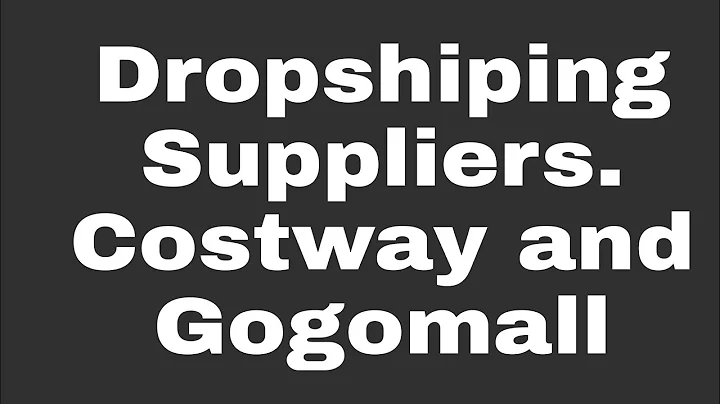Start a Profitable Dropshipping Business in Kenya
Table of Contents
- Introduction
- What is dropshipping?
- The Benefits of Dropshipping
- How to Start a Dropshipping Business
- Choosing a Niche
- Finding Reliable Suppliers
- Selecting a Selling Platform
- Setting up Your Online Store
- Marketing and Promoting Your Store
- Handling Customer Orders
- Managing Inventory and Fulfillment
- Dropshipping Platforms
- Jumia
- Kilimall
- Jumia Shop
- Choosing the Right Platform
- Tips for Successful Dropshipping
- Conclusion
What is Dropshipping and How to Start Your Own Business
Dropshipping is a retail business model in which the seller accepts customer orders but does not keep the goods sold in stock. Instead, the seller purchases the items from a third-party supplier who then ships them directly to the customer. This eliminates the need for the seller to invest in inventory or handle the logistics of shipping.
Starting a dropshipping business can be an attractive option for entrepreneurs looking to venture into e-commerce without the burdens of managing inventory. In this article, we will explore the step-by-step process of starting a dropshipping business and provide insights into the best platforms to kickstart your journey.
The Benefits of Dropshipping
Dropshipping offers several advantages for aspiring entrepreneurs. Here are some key benefits:
-
Low startup costs: Since you don't need to invest in inventory upfront, the initial costs of starting a dropshipping business are significantly lower compared to traditional retail models.
-
Minimal risk: With no inventory to manage, there's no risk of ending up with unsold products or tying up capital in slow-moving inventory.
-
Flexibility and scalability: Dropshipping allows you to easily test, change, and expand your product offerings without the constraints of physical inventory.
-
Location independence: As a dropshipper, you have the freedom to run your business from anywhere with an internet connection, giving you the potential for a flexible lifestyle.
Now that we understand the concept and benefits of dropshipping, let's delve into the step-by-step process of starting your own dropshipping business.
How to Start a Dropshipping Business
1. Choosing a Niche
Before starting your dropshipping journey, it's crucial to select a profitable niche. Identify a target audience and research products that align with their needs and interests. Look for niche markets with high demand and low competition to maximize your chances of success.
2. Finding Reliable Suppliers
One of the most critical aspects of dropshipping is sourcing reliable suppliers who can consistently provide high-quality products. Look for suppliers with a good track record, positive customer reviews, and excellent shipping times. Platforms like Jumia, Kilimall, and Jumia Shop offer a wide range of trusted suppliers.
3. Selecting a Selling Platform
Choose a reputable e-commerce platform to host your online store. Platforms like Jumia, Kilimall, and Jumia Shop provide user-friendly interfaces, easy store setup, and built-in marketing tools. Consider the platform's fees, features, and target audience before making a decision.
4. Setting up Your Online Store
Once you've chosen a platform, create your online store. Customize the design, import products from your chosen suppliers, and optimize your store for search engine visibility. Write compelling product descriptions and focus on creating a seamless user experience to maximize conversions.
5. Marketing and Promoting Your Store
To drive traffic to your store, implement various marketing strategies such as social media advertising, content marketing, influencer partnerships, and search engine optimization. Leverage the power of digital marketing to reach your target audience and generate sales.
6. Handling Customer Orders
As a dropshipper, your role is to facilitate the ordering process and ensure smooth communication between customers and suppliers. Automate order fulfillment by integrating your store with your suppliers' systems. Keep customers updated on order status and handle any product-related inquiries promptly.
7. Managing Inventory and Fulfillment
Since you don't physically handle the inventory, it's crucial to constantly monitor stock availability from your suppliers. Stay in close contact with your suppliers to ensure a seamless order fulfillment process. Regularly review supplier performance and make adjustments as necessary.
Dropshipping Platforms: Jumia, Kilimall, and Jumia Shop
When it comes to dropshipping in Kenya, several platforms are popular among entrepreneurs. Let's take a closer look at three prominent platforms:
-
Jumia: Known as the largest online marketplace in Africa, Jumia offers a wide range of products and reliable suppliers. It provides a user-friendly platform and robust support for dropshipping businesses.
-
Kilimall: Kilimall is another popular e-commerce platform in Kenya. With a large customer base and a variety of product categories, it offers an excellent opportunity for dropshippers.
-
Jumia Shop: Jumia Shop is a subsidiary platform of Jumia that specifically caters to dropshipping businesses. It focuses on providing a seamless dropshipping experience for sellers.
Choosing the Right Platform
When selecting a dropshipping platform, consider factors such as the platform's reputation, ease of use, product range, fees, and seller support. Assess the specific needs of your business and choose the platform that aligns best with your goals and target audience.
Tips for Successful Dropshipping
- Choose products with high demand and low competition.
- Build a strong relationship with your suppliers to ensure reliable and timely product fulfillment.
- Focus on providing excellent customer service to build trust and loyalty.
- Continuously optimize your store for search engine visibility to attract organic traffic.
- Stay updated with market trends and adapt your product offerings accordingly.
- Regularly review your supplier performance and consider expanding to multiple suppliers for diversification.
Conclusion
Starting a dropshipping business can be an exciting and profitable venture. By following the step-by-step process outlined in this article, you'll be well-equipped to start your journey. Remember to choose a profitable niche, find reliable suppliers, and select the right platform for your business. With dedication and perseverance, you can build a successful dropshipping empire. Good luck!
Highlights
- Dropshipping is a retail business model where the seller accepts customer orders but does not keep the goods in stock.
- Starting a dropshipping business has low startup costs and offers flexibility and scalability.
- The key steps to start a dropshipping business include choosing a niche, finding reliable suppliers, selecting a selling platform, setting up an online store, and marketing and promoting the store.
- Popular dropshipping platforms in Kenya include Jumia, Kilimall, and Jumia Shop.
- Successful dropshipping requires choosing the right products, building strong relationships with suppliers, providing excellent customer service, and continuously optimizing the store.
FAQ
Q: Can I start dropshipping without any inventory?
A: Yes, dropshipping allows you to sell products without needing to own or manage inventory.
Q: Do I need a website to start a dropshipping business?
A: While having a website is beneficial, it's not mandatory. You can start by selling on established e-commerce platforms like Jumia or Kilimall.
Q: Can I choose multiple suppliers for my dropshipping business?
A: Yes, working with multiple suppliers can provide diversification and ensure a steady supply of products.
Q: How do I handle returns and customer refunds in dropshipping?
A: It's essential to have clear return and refund policies in place. Communicate the policies with customers and work closely with your suppliers to streamline the return process.
Q: Is dropshipping a sustainable long-term business model?
A: Dropshipping can be a sustainable business model if executed properly. Continuously adapt to market trends, focus on quality customer service, and build strong relationships with suppliers to ensure long-term success.



















